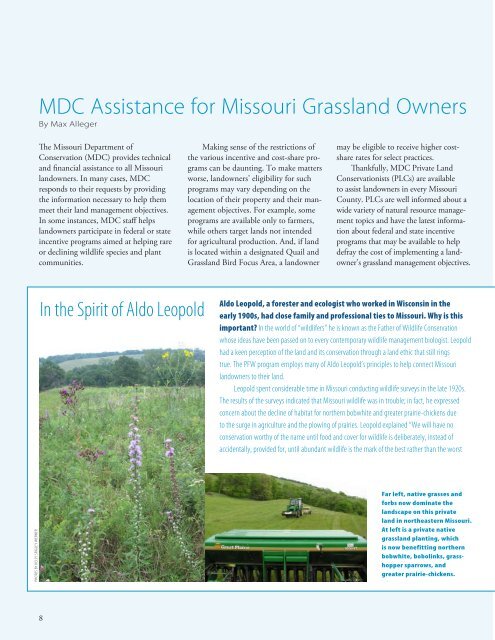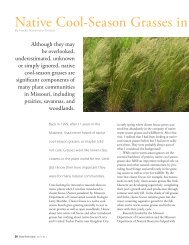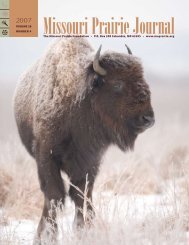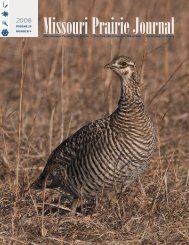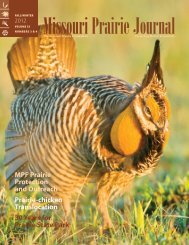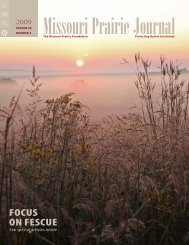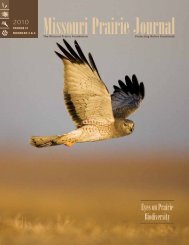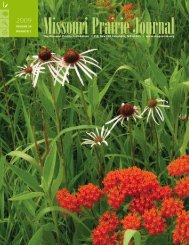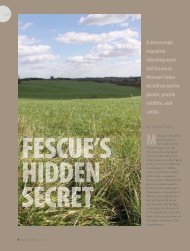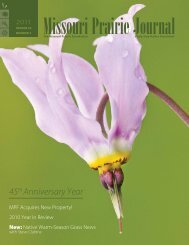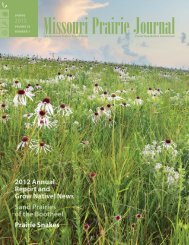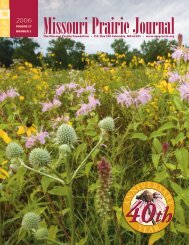MDC Assistance for <strong>Missouri</strong> Grassland OwnersBy Max AllegerThe <strong>Missouri</strong> Department ofConservation (MDC) provides technicaland financial assistance to all <strong>Missouri</strong>landowners. In many cases, MDCresponds to their requests by providingthe information necessary to help themmeet their land management objectives.In some instances, MDC staff helpslandowners participate in federal or stateincentive programs aimed at helping rareor declining wildlife species and plantcommunities.Making sense of the restrictions ofthe various incentive and cost-share programscan be daunting. To make mattersworse, landowners’ eligibility for suchprograms may vary depending on thelocation of their property and their managementobjectives. For example, someprograms are available only to farmers,while others target lands not intendedfor agricultural production. And, if landis located within a designated Quail andGrassland Bird Focus Area, a landownermay be eligible to receive higher costsharerates for select practices.Thankfully, MDC Private LandConservationists (PLCs) are availableto assist landowners in every <strong>Missouri</strong>County. PLCs are well informed about awide variety of natural resource managementtopics and have the latest informationabout federal and state incentiveprograms that may be available to helpdefray the cost of implementing a landowner’sgrassland management objectives.In the Spirit of Aldo LeopoldAldo Leopold, a forester and ecologist who worked in Wisconsin in theearly 1900s, had close family and professional ties to <strong>Missouri</strong>. Why is thisimportant? In the world of “wildlifers” he is known as the Father of Wildlife Conservationwhose ideas have been passed on to every contemporary wildlife management biologist. Leopoldhad a keen perception of the land and its conservation through a land ethic that still ringstrue. The PFW program employs many of Aldo Leopold’s principles to help connect <strong>Missouri</strong>landowners to their land.Leopold spent considerable time in <strong>Missouri</strong> conducting wildlife surveys in the late 1920s.The results of the surveys indicated that <strong>Missouri</strong> wildlife was in trouble; in fact, he expressedconcern about the decline of habitat for northern bobwhite and greater prairie-chickens dueto the surge in agriculture and the plowing of prairies. Leopold explained “We will have noconservation worthy of the name until food and cover for wildlife is deliberately, instead ofaccidentally, provided for, until abundant wildlife is the mark of the best rather than the worstPhotos by Kelly Srigley wernerFar left, native grasses andforbs now dominate thelandscape on this privateland in northeastern <strong>Missouri</strong>.At left is a private nativegrassland planting, whichis now benefitting northernbobwhite, bobolinks, grasshoppersparrows, andgreater prairie-chickens.
MDC provides funds for landownerswho want to improve habitats ontheir property. Although MDC fundsare far less than those available throughUSDA programs, they can be simplerto tap into for landowners with highlyfocused land management objectives.MDC funds are delivered via the MDCLandowner Assistance Program. Therulebook for this program is called theLandowner Incentive Docket. Thedocket describes available programsalong with the payment rates, rulesand requirements for each. Althoughthe docket includes practices aimed ataddressing the full range of resourceissues faced by <strong>Missouri</strong> landowners, theremainder of this article highlights justthose that are most commonly appliedto restore native prairie remnants, orimprove the habitat value of other privatelyowned grasslands.Before delving into individual practices,let me point out that landownerrequests for MDC private land fundsalmost always outstrip availability,which often occurs very early within afiscal year. The availability of the practicesdescribed below, as well as thecost-share rates for some, may also varyamong MDC administrative regionsacross the state. There are a couple offarming.” The USFWS private lands program follows Leopold’s premise that for conservation to besuccessful it needs to be practiced on private land where wildlife can have large landscapes to thriverather than being squeezed onto small publicly managed tracts, and the role of government agencies isto help with demonstration, research and public outreach.Leopold wanted conservation to be a focus in <strong>Missouri</strong>. Back in his day, he hoped that <strong>Missouri</strong> wouldnever become industrialized in mind and spirit. <strong>Missouri</strong>ans have proven that conservation is important asevidenced in the conservation sales tax and the parks and soils tax. However, more can be done.In this fast-paced world we live in with the Internet, video games, iPods and cell phones, it is moreimportant than ever to stay in touch with the land and teach children about the wonders of our naturalworld—through a day fishing, hunting, observing prairie-chickens on a lek or walking through a prairie.Nearly 70 years since Leopold’s surveys, the prairie conservation community remains concerned aboutprairie-chickens but now many other birds have been added to the list, including common species likethe eastern meadowlark and dickcissel. Leopold said “Conservation is a state of harmony between menand land. The last word in ignorance is the man who says of an animal or plant: ‘What good is it?’ Ifthe land mechanism as a whole is good, then every part is good, whether we understand it or not.” TheUSFWS can help landowners connect with every part of their land and keep common species commonthrough the PFW program.Kelly Srigley WernerFor more on Aldo Leopold, read A Sand County Almanac. For more information on declining bird speciesvisit http://www.audubon.org/bird/stateofthebirds/CBID/index.php.important rules of thumb to considerabout these programs:• MDC cost-share funds may be used incombination with federal funds fromthe USFWS or the USDA, but thereare some exceptions, which PLCs canexplain. However, a landowner cannotreceive funds from any combination ofsources in ways that pay for the samework more than once. Landowners cansometimes reduce the out-of-pocketcosts of implementing conservationpractices by counting their labor aspart of their required match.• None of the following practices maybe applied to lands enrolled in CRPunless: 1) the land is not eligible forUSDA mid-contract managementcost-share, 2) at least three yearsremain on the CRP contract, and3) the land is located in a Quail andGrassland Bird Focus Area.As you will read below, the detailscan quickly become confusing, so consultationwith your local PLC is likelyyour best next step after reading aboutthe practices. PCLs will be better ableto assist you if you begin with a gooddescription of the problem(s) you’retrying to overcome or the managementobjectives you have for your land. Oftentimes, a PLC will ask for an opportunityto walk the land with you to betterunderstand your vision for the propertybefore talking about specific incentiveor cost-share programs or practices. Youcan contact your local PLC by callingyour nearest MDC office or by loggingonto http://www.mdc.mo.gov/landown/contacts/.


